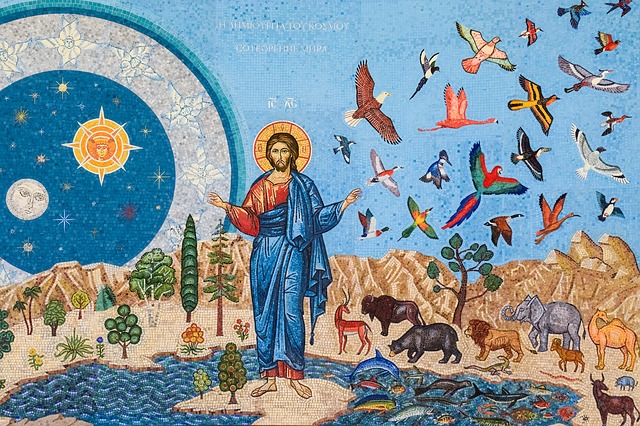Is Genesis History or Myth?
By Doug Woodward
When we were kids, we learned the story of George Washington and the cherry tree. Fascinated and duly proud by his new hatchet, little George had to find something that needed to be chopped down.
He happened upon the famed cherry tree. Chop, chop, chop, and the tree – not that much taller than George – went down with a soft rustling of its leaves. Then, within a minute or two, his father saw what had happened and he challenged George with the obvious allegation, “What did you do?” Supposedly without any hesitation, George said, “I cannot tell a lie. I chopped down the cherry tree.”
Whether George got in trouble or not is not the outcome anyone cares about. Nor is it, “Did it really happen?” Most historians believe it did not. The point was the father of our country demonstrated his commitment to the truth even as a child.
We do learn things from myth. Moral lessons are frequently the subject matter of fables, parables, and myths. But can historical events also teach us important lessons?
Absolutely. Perhaps the most famous way to express how history can provide “those teachable moments” is the oft-quoted line, “Those who cannot learn the lessons of history are doomed to repeat them” (George Santayana, 1863-1952). We see such blunders in geopolitics every day since most leaders are not students of history.

The Genesis Question
When we turn to the stories of Genesis 1-11, we come upon Adam and Eve, Cain and Abel, the disobedience of humanity, Noah, Nimrod, and finally, to the subject of much of the rest of Genesis, Abraham.
It is certainly true that there are several things that challenge those who believe the Bible is God’s Word, is inspired, and is without error (in its original composition).
When we read Genesis 1-11, we encounter some of the most difficult Biblical pills to swallow: A creation in seven days; only two persons beginning the saga of homo sapiens;the sons of God (angelic beings) mating with human women; Noah building a massive ark on terra firma to hold pairs of land and air animals (God selected) protecting them from the Great Flood; the testimony that the Patriarchs lived into their tenth century (e.g., Adam to 950 years and Methuselah to 969); and finally the Tower of Babel event (an ancient skyscraper reaching into the heavens) whose destruction by an purposeful act of God caused humanity to scatter and ultimately, to replenish the entire earth.
Since the Enlightenment 250 years ago, Bible believers have looked for a way to believe the Bible is true even while admitting these stories from Genesis 1-11 appear to be tall tales. Some surely think, “Aren’t the accounts of Genesis 1-11 just too fantastic to believe?” The challenges of science – astronomy, anthropology, Darwinian biology, and more recently archeology – have tested the Bible as the knowledge most people rely on. So, can we find a way to put the history question aside and still believe the Bible is true?
A good percentage of laity do not have a problem squaring the Bible with science.

In 2004, in a poll conducted by ABC News, the findings of the inquiry showed most Americans still believe in the historicity of Biblical events. Out of 1,011 adults, 61 percent of Americans believe the account of creation in the Bible’s book of Genesis is “literally true” rather than a story meant as a “lesson,” 60 percent believe in the story of Noah’s Ark and a global flood, while 64 percent agree that Moses parted the Red Sea to save fleeing Jews from their Egyptian captors.
But in a more recent study by Gallup, in 2017, the number of Americans that believed in the historical aspects of the Bible declined. 24 percent believed the Bible is the literal Word of God, which was the lowest percentage in Gallup’s 40-year polling.
While 47 percent still believed the Bible is the inspired Word of God, 26 percent continued to believe in the Bible’s accounts being historical and capable of passing the challenge from secular historians. However, reassuring these numbers are or are not, they do not tell the whole story.
If we were to survey seminarians from most schools (both teachers and graduates – anyone trained in the last 40 years), we would find the professional clergy is much less likely to believe in the historical aspects of the early portions of the Bible. Most would talk about Genesis 1-11 not as history, but as myth.

Myths of the Ancient World
The evidence against the historicity of the Genesis events consists in a variety of factors. One of the most important is that the Biblical accounts have elements in common with early Mesopotamian epics (i.e., Sumerian, Akkadian, and Babylonian versions) such as The Epic of Gilgamesh, Enuma Elish, and Atrahasis.
Indeed, when we consider the similar stories of Mesopotamia – often characterized as the source for the Bible’s accounts – most evangelical scholars have forsaken the premise that real history exists within the first eleven chapters of the Bible.
But what is “myth? When we hear the word in our everyday usage, we know it means something like, “What fools believe that isn’t true.” However, this is expressly not the way that theologians use the term.
The Biblical story has value even if doubters insist it contains falsehoods. So, there is still truth present there through its mythical qualities. But was history so far from the author’s mind? Does Genesis 1-11 possess only moral imperatives? Or do the accounts teach us what happened “way back when”?
Andre van Oudtshoorn, Dean of Academics and Research at Perth Bible College, produced a lengthy paper on this topic in 2015 entitled, “Mything the Point: The Use of Mythology in Genesis 1-11.” He is a perfect example of how evangelical scholars have forsaken the history of Genesis’ initial chapters. He explains myth this way: “Texts which are intended to orientate people within their everyday reality by telling them who they are, what God or the gods are like, and how they relate to God(s) and the world, are technically designated as myths.”
According to Oudtshoorn, the tellers of these tales never thought the tales were real history – they were simply shared stories explaining the mysteries of life.
Some scholars affirm that Genesis 1-11 intends to critique and challenge the prevailing myths of ancient times. Author Tim Deppe states, “Many scholars have proposed that Genesis 1-11 is designed to intentionally and deliberately critique Mesopotamian and other contemporary surrounding ideologies.”

He goes on to cite scholar G.J. Wenham who contends that Genesis is “a tract for the times, challenging ancient assumptions about the nature of God, the world, and mankind.” In contrast with creation myths from cultures round about Israel, “We are presented in the very first sentence with a single God who has no rivals. There is not even a hint of any cosmic battle…” In grand contrast to the Egyptian creation myth, Genesis 1:1 supplies the backdrop for the whole story that follows. “This verse then refers to the creation of the entire universe and implies that God created it from nothing, thus further emphasizing his complete sovereignty and lack of rivals.”
The sun, moon, and stars are for signs and seasons, not for worship. There is a “democratizing” component of the story too as humans are to dominate (as stewards) animals but not each other.
Truth can be expressed through tales and parables. We can discern it without addressing whether history does or does not supply the reason why our Genesis “myths” are superior to its competition.
We find strong counterpoints from the stories told in Genesis 1-11 contradicting the myths of the surrounding cultures: Sumerian, Akkadian, and Babylonian. To select a few from Genesis 1 and 2:
· God created a distinct cosmos by Himself. There were no other gods helping Him.
· The world He created was not a part of Him, although He always seems to be everywhere (that is, wherever the protagonists of the accounts are).
· Humanity rules the natural world – not the gods. There are humans and there are animals. And there is Elohim-Yahweh. No other characters are cast in the play.
· Humans are not animals – they are made in the image of God. Human beings should look upward to God not downward to animals to understand their core nature.
· God wants humanity to take dominion, not to allow the gods to run (or ruin) their lives.
Gerhard F. Hasel provides this summary:
“With a great many safeguards, Gen(esis) 1 employs certain terms and motifs, partly taken from ideologically and theologically incompatible predecessors and partly chosen in deliberate contrast to comparable ancient Near Eastern concepts, and uses them with a meaning and emphasis not only consonant with but expressive of the purpose, world-view, and understanding of reality as expressed in the Hebrew account of creation.”
Hasel argues that Genesis 1-11 constructively counters the myths of Mesopotamia by advancing the Hebrew point of view. For most of the world today (and for many centuries), the Judean “myths” are superior to the other Mesopotamian epics. However, this is not as easily proven as simply asserting it is so. And therein lies the rub.

Indeed, these scholars present Genesis 1-11 as myth only – because the worldview of this early portion of Scripture can only be affirmed as myth and not history.
The problem with the scholars of most evangelical seminaries today is they have rejected for so long the history that underlies Genesis 1-11 that it is pointless to argue history plays any part in substantiating the “myths.” Given their allegiance to myth, history is forsaken.
But can we assert the Genesis 1-11 accounts gain synergy when history and myth are combined? Yes, if for no other reason that the fact the writer tells us it is. The Bible’s mythical accounts must possess a kernel (or more) of fact.

Adam and Eve (and Genesis) are Historical
Myth and history are not incompatible. Adam and Eve were historical. They really lived. If we settle on only one aspect of the account (it being solely historical or it being only mythical), we undermine what the Author imparts to His readers. Sacrificing history to preserve the value of the text, which is really what modern-day evangelical scholars are doing, is not the panacea they think it is.
The late Christian intellectual Francis Schaeffer explained this point using a somewhat obscure concept. Completely separating history from Biblical accounts puts the truth of the Bible on the “upper shelf” where it is out of reach. This means that if you assert there is no historical basis for the account even when it presents itself as such, you still insist the account is true, you have double-talked your way into intellectual oblivion. Logic judges that you are talking nonsense.
That is why we must still insist the first eleven chapters of Genesis are historical even though the details are few and seem to contradict life as we know it today.
Some aspects of the episode must be historical (since it was written as history, not just myth). Otherwise, the account is suspect. Asserting only the moral or ethical teaching as true ignores the core of historical facticity underpinning the account.
In reading Genesis 1-11, we ought to be mindful of the varied features of both myth and history. Only then can we be trust what the Biblical Author sought to tell us.


S. Douglas Woodward, Th.M., MA in Finance, has served as an executive for Oracle, Microsoft, and as a Partner at Ernst & Young LLP. He was recently an Adjunct Professor and Entrepreneur-in-Residence at the University of Oklahoma for five years. Doug has written eighteen books on the topics of eschatology, theology, and geopolitics. He frequently appears on radio and television programs, having been interviewed on over 100 different occasions on dozens of shows. He has two children, two grandchildren, and lives with wife Donna of 45 years in Oklahoma City. Learn more at www.faith-happens.com.



